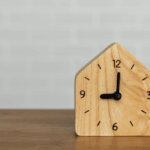
(Guest post.)
Buying a home. Now, there’s a phrase dense with the weight of life’s big milestones. It’s like saying, “I’m getting married” or “We’re having a baby”. It carries that same air of impending permanence, but instead of ruffled veils or ultrasounds, there are mortgage brokers and real estate listings at odd hours. Somehow, all of this – the sleepless scrolling, the agent phone calls, the oh-so-elegant shoe covers you wear in other people’s foyers – boils down to one colossal moment: you walk into a house, and either it feels like home, or it doesn’t. But wait. Feeling isn’t (or shouldn’t be) everything, is it? The creak of the floorboards that seems charming today might be a costly structural issue tomorrow. That dreamy backyard could turn into a swamp every time it rains. Luckily, there’s practicality, the dutiful foil to your romantic gut instincts. Together, these two – your heart and, well, your spreadsheets – must get you safely through the labyrinth of home buying. Here’s how to balance gut instinct with practicality in home buying.
The quiet chaos of intuition
Picture this: you step into a house, and your senses do something strange. Your brain whispers, Yes. This is it. It’s not logical. It’s not even really rational. But there it is. Maybe it’s the slant of the light in the kitchen or the way the air smells faintly of freshly baked cookies. It doesn’t matter. Something in you decides, almost instantly, that you could live here: your dream home.
This is intuition, the word we use to explain what feels like magic but is really just a brilliant neurological shortcut. Scientists say it’s your subconscious working overtime, sifting through years of stored experience to deliver an answer faster than conscious thought ever could. You don’t know why the house feels right – it just does.
And intuition is often right, which is why so many buyers swear by it. But let’s not pretend it’s infallible. The same gut that says “yes” to the charming two-story Craftsman might be ignoring the fact that it’s located directly under a flight path. Intuition, as lovely as it is, needs a counterbalance.
Practicality: the house inspector you didn’t ask for
If gut instinct is all romance, practicality is the reliable friend who keeps receipts. Practicality doesn’t care about your feelings. It doesn’t give a second thought to the Instagram-worthy glow of that sunroom or the nostalgic pull of a staircase that feels like an instant portal to your grandparents’ house. Practicality cares about the stuff you’d rather not think about – leaky roofs, skyrocketing insurance rates, zoning restrictions. Yup, the boring stuff.
It asks the uncomfortable questions:
How many years does the HVAC have left?
Are you ready to shovel snow off that picturesque driveway every winter?
And what’s the resale value of this place if you decide you hate it in five years?
Practicality doesn’t glow. It doesn’t have an aura. But it does its job. It spots the cracks in the foundation (both literal and metaphorical) and saves you from falling through.
The (kind of) unlikely partnership
Here’s the tricky part: gut instinct and practicality in home buying aren’t something you’d call natural collaborators. They’re more like roommates who argue over whose turn it is to do the dishes or buy toilet paper. Your gut might fall head-over-heels for a place with a spiral staircase and ivy creeping up the walls while practicality sulks in the corner, muttering about “energy efficiency” and “property taxes”. The key to balance is letting both voices have their say. When one screams louder than the other, pause.
Ask yourself what’s fueling the reaction. Is your gut responding to something real – like how natural light makes you feel – or is it clinging to a romanticized idea of what you think you should want? Is practicality genuinely warning you about a problem, or is it overcompensating for fear of taking a risk?
And while you’re at it, consider the bigger picture – if this move means you’ll need to plan a smooth interstate journey, is the house still the right choice when you factor in the logistics of relocating? Moving to another state is an adventure on its own. So, keep in mind that this balance we’re emphasizing isn’t about compromise. It’s about clarity. The best decisions happen when instinct and reason align. If a house feels good and makes sense, you’ve likely found a winner.
When instincts steer wrong
Let’s talk about red flags – the ones your gut sometimes refuses to see. You might fall for a place because it’s the first house you’ve seen that doesn’t reek of old carpet. But then the inspection report comes back, and it’s bad. Like, rewire-the-entire-house bad.
This is where practicality flexes its muscles. It steps in and says: “Okay, yes, the bay windows are lovely, but they won’t matter once you’re pouring money into countless repairs”. Trust it in these moments. Gut instinct may lead you toward a house, but practicality makes sure you’re not running with arms wide open directly into a trap.
…but practicality isn’t perfect either
Now, let’s be fair. Practicality has its own flaws. It can be overly cautious, too quick to dismiss a property that’s rough around the edges but full of potential. Sometimes, the numbers don’t tell the whole story. Maybe the fixer-upper with peeling paint and an ancient water heater is exactly the project your creative side needs.
Practicality needs intuition to help it see the intangible – the charm of a certain space, the emotional connection that spreadsheets can’t quantify. Without gut instinct, practicality might guide you to a house that checks every box but leaves you feeling uninspired and detached – a perfectly functional space, but one that feels more like someone else’s dream than your own.
Sitting with the decision
Once you’ve found a house that seems to strike the right balance, give yourself time to sit with the decision. Visit it again, ideally at a different time of day. Does the neighborhood feel just as inviting at dusk as it does at noon? Is the house as quiet on a weekday morning as it was on Sunday afternoon?
Time has a way of revealing things that first impressions don’t. That magical feeling you had during the initial visit might fade, or – for all we know – it might deepen. Practicality might uncover something you’ve missed, or your gut might notice something that makes you love the house even more.
A home, not just a house (Conclusion)
Gut instinct with practicality in home buying isn’t a battle; it’s a collaboration. Together, they help you see a house for what it is – a potential home with all its flaws and possibilities.
No house will ever be perfect, but that’s not the point. The point is finding a place where you can imagine your life unfolding. A place that feels good enough for today and sensible enough for tomorrow. Trust your gut, listen to reason, and soon enough, you’ll find yourself somewhere that fits. Somewhere that isn’t just a roof over your head but a story you’re ready to live in.





